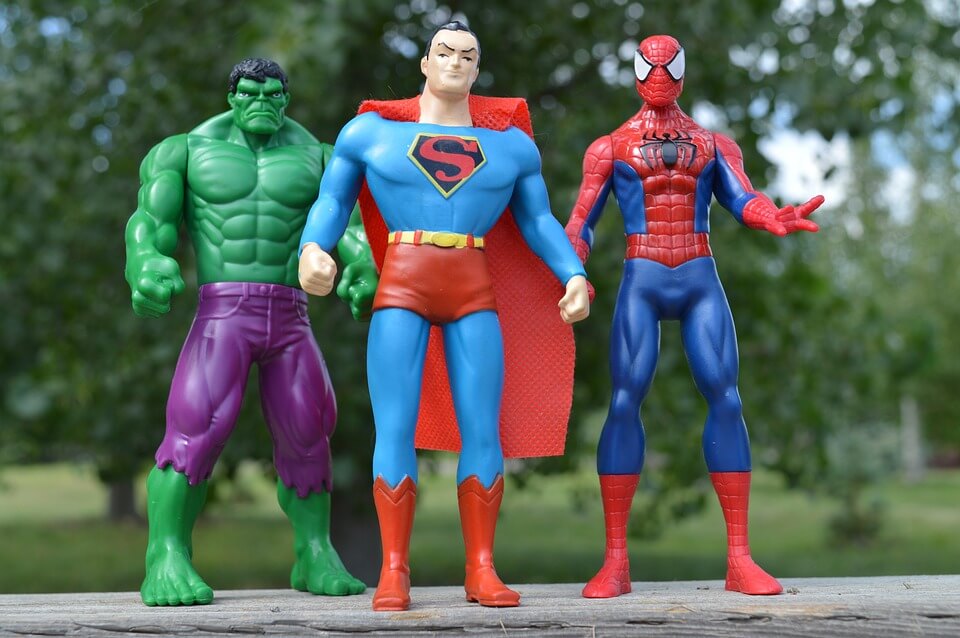Why Superheroes Are Important to Children


Reviewed and approved by the psychologist María Alejandra Castro Arbeláez
Superheroes play an important role in the lives of children, especially very young children, as they can positively influence to a great extent the process of their development. Every child has a favorite idol with supernatural abilities whose main goal is to save the world from the villains around him. In the following article, we’ll talk more about why superheroes are important to children.
Child development and superheroes
These characters and their stories can inspire imagination and identity and promote pro-social behaviors in a child. Spain’s National Association for the Education of Young Children explains how superhero play helps children develop language and problem-solving skills.
Superheroes Help Foster a Taste for Science, Technology, Engineering, and Math

For children, their superheroes can be a great motivator to spark an interest in science, technology, engineering, and math topics. At the same time, they can get children interested in exploring real-world concepts related to these topics.
Some of the superheroes we know don’t have superpowers as such, but rather use their skills and ingenuity to create and in part support the superhero they characterize. Let’s look at some examples:
- Batman. He uses science, engineering, and technology to create his Batmobile, special suit, and accessories to help him fight the villains of Gotham City.
- Iron Man. Tony Stark wouldn’t be an Avenger without his Iron Man suit, which he created using the highest technology, mathematical equations, and his ingenuity. Let’s not forget that Tony also creates robots to help him do certain tasks in his lab.
- Captain America. He went from being a “weak” man to a super soldier after being injected with a serum developed by a scientist. He also uses a shield designed from an advanced metal formula.
Reading and art are more fun with superheroes
Comic books with superhero stories always capture the attention of children. By using superheroes to develop an interest in reading, children will develop literacy skills while enjoying it.
In addition, the superhero illustrations in these books can develop a child’s appreciation for art, fine motor skills, and handwriting.
Imaginative play with superheroes
What child doesn’t love playing the role of their favorite superhero? Some studies show that this type of unstructured play promotes the development of social and emotional skills, stimulates creativity, and improves language skills.
Learning moral values
Superheroes act kindly and always help others. They’re great examples of the fact that you don’t have to be rich or famous to become great people.
Good influences are a necessity to help a child become a positive person for society, and superheroes can provide that.
Let’s look at examples of some superheroes that demonstrate the above:

- The Hulk. The duality of Bruce Banner and the Hulk shows that even though things aren’t perfect, people can still make the best of them. His daily struggle to control his tempers is an especially good trait to show to young children who they can relate.
- Spider-Man. Despite his superpowers, Peter Parker is an ordinary teenager. He doesn’t seek fame or wealth, as he lives with the basics. What this superhero really cares about is helping other people.
- Superman. Clark Kent’s just another ordinary person with a normal job and a big heart and love for his adoptive parents. Superman isn’t interested in fame or recognition, only in helping the planet that adopted him and its inhabitants.
- Thor. Thor gives a great lesson through his humble story, which reflects the importance of owning your mistakes, learning from humility, and being empathetic.
By identifying with their heroes, children gain power, discover feelings like empathy and compassion, and learn to help others in need. And, at the same time, they start to grasp the difference between good and evil.
Advice to parents:
While superheroes can provide important role models and help reinforce a child’s creativity, they can also present a level of danger for children who take the superhero fantasy too far.
It’s important that you help your child maintain an appreciation for superheroes without engaging in unrealistic or dangerous behavior.
Make sure your child understands the difference between human and superhuman abilities and that putting on a superhero costume doesn’t give them superhuman powers.
Superheroes play an important role in the lives of children, especially very young children, as they can positively influence to a great extent the process of their development. Every child has a favorite idol with supernatural abilities whose main goal is to save the world from the villains around him. In the following article, we’ll talk more about why superheroes are important to children.
Child development and superheroes
These characters and their stories can inspire imagination and identity and promote pro-social behaviors in a child. Spain’s National Association for the Education of Young Children explains how superhero play helps children develop language and problem-solving skills.
Superheroes Help Foster a Taste for Science, Technology, Engineering, and Math

For children, their superheroes can be a great motivator to spark an interest in science, technology, engineering, and math topics. At the same time, they can get children interested in exploring real-world concepts related to these topics.
Some of the superheroes we know don’t have superpowers as such, but rather use their skills and ingenuity to create and in part support the superhero they characterize. Let’s look at some examples:
- Batman. He uses science, engineering, and technology to create his Batmobile, special suit, and accessories to help him fight the villains of Gotham City.
- Iron Man. Tony Stark wouldn’t be an Avenger without his Iron Man suit, which he created using the highest technology, mathematical equations, and his ingenuity. Let’s not forget that Tony also creates robots to help him do certain tasks in his lab.
- Captain America. He went from being a “weak” man to a super soldier after being injected with a serum developed by a scientist. He also uses a shield designed from an advanced metal formula.
Reading and art are more fun with superheroes
Comic books with superhero stories always capture the attention of children. By using superheroes to develop an interest in reading, children will develop literacy skills while enjoying it.
In addition, the superhero illustrations in these books can develop a child’s appreciation for art, fine motor skills, and handwriting.
Imaginative play with superheroes
What child doesn’t love playing the role of their favorite superhero? Some studies show that this type of unstructured play promotes the development of social and emotional skills, stimulates creativity, and improves language skills.
Learning moral values
Superheroes act kindly and always help others. They’re great examples of the fact that you don’t have to be rich or famous to become great people.
Good influences are a necessity to help a child become a positive person for society, and superheroes can provide that.
Let’s look at examples of some superheroes that demonstrate the above:

- The Hulk. The duality of Bruce Banner and the Hulk shows that even though things aren’t perfect, people can still make the best of them. His daily struggle to control his tempers is an especially good trait to show to young children who they can relate.
- Spider-Man. Despite his superpowers, Peter Parker is an ordinary teenager. He doesn’t seek fame or wealth, as he lives with the basics. What this superhero really cares about is helping other people.
- Superman. Clark Kent’s just another ordinary person with a normal job and a big heart and love for his adoptive parents. Superman isn’t interested in fame or recognition, only in helping the planet that adopted him and its inhabitants.
- Thor. Thor gives a great lesson through his humble story, which reflects the importance of owning your mistakes, learning from humility, and being empathetic.
By identifying with their heroes, children gain power, discover feelings like empathy and compassion, and learn to help others in need. And, at the same time, they start to grasp the difference between good and evil.
Advice to parents:
While superheroes can provide important role models and help reinforce a child’s creativity, they can also present a level of danger for children who take the superhero fantasy too far.
It’s important that you help your child maintain an appreciation for superheroes without engaging in unrealistic or dangerous behavior.
Make sure your child understands the difference between human and superhuman abilities and that putting on a superhero costume doesn’t give them superhuman powers.
All cited sources were thoroughly reviewed by our team to ensure their quality, reliability, currency, and validity. The bibliography of this article was considered reliable and of academic or scientific accuracy.
- Castellanos-Sotelo, L. S., Coy-Pineda, G. M., & Ramírez-Riaño, D. M. (2019). “Inteligencia emocional”, una estrategia pedagógica para mejorar la convivencia escolar. Educación Y Ciencia, (23), 237-250.
- Córdova Rodríguez, A. L., & Sánchez Sánchez, M. N. (2020). Análisis semiótico del superhéroe Iron-Man y la construcción del bien y el mal desde Nietzsche (Bachelor’s thesis).
- Sastre de Blas, M. (2017). El proceso simbólico y la construcción del sujeto, a partir de la relación adulto-niño. Desarrollo como revolución. Obtenido de Repositorio. Universidad Complutense de Madrid:
- https://eprints.ucm.es/43278/1/T38924.pdf
This text is provided for informational purposes only and does not replace consultation with a professional. If in doubt, consult your specialist.








